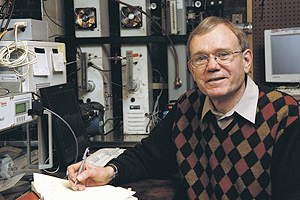![[Chronicle]](/images/sidebar_header_oct06.gif)
Vol. 26 No. 9
current issue
archive / search
contact
Past Opine interviews:
Lauren Berlant
Stephen Berry
John Boyer
David Cohen
Jerry Coyne
John Cunningham
Richard Epstein
John Frederick
Henry Frisch
Austan Goolsbee
Bernard Harcourt
Greg Jackson
Martin Marty
Martha Nussbaum
Raymond Pierrehumbert
José Quintáns
Jan-Marino Ramirez
Saskia Sassen
William Sewell
Herman Sinaiko
Geoffrey Stone
Cass Sunstein
Simon Swordy
Opine: John Frederick
 John Frederick | |
This week, John Frederick, Professor in Geophysical Sciences and the College, Master of the Physical Sciences Collegiate Division and Associate Dean of the Division of the Physical Sciences and the College, is of the opinion . . .
What book should every person read and why?
Economics in One Lesson by Henry Hazlitt: This book sets forth, in layman’s terms, the principles upon which to build the economic system of a free society. Some people will agree with the ideas expressed in the book and some will not, but all citizens should have an understanding of these issues.
If you could meet any scholar, author, composer, musician or entrepreneur—dead or alive—who would it be and why?
Thomas Edison: Edison was both an inventor and entrepreneur who focused on providing practical technologies (e.g. electrical power, communications) that ultimately improved the living standards of innumerable people. It was difficult to give only one name here. Other people on the list are, in alphabetical order, John Bogle, Henry Ford and Thomas Jefferson.
Among the complex moral and political issues that affect humanity, which do you believe will never be resolved and why?
People are inherently different in ability, motivation, value systems and starting points in life. Inevitably, they will achieve different levels of success in whatever they choose to do. These unequal ends will lead to conflict rooted in differing beliefs, envy and the desire for power.
If politicians had to pass an exam before they were allowed to serve in public office, what question would you add to the test?
Have you read and understood all aspects of the Declaration of Independence? We would need to develop a fail-safe way to check the validity of their responses.
If you could choose any three University professors and give them a one-year sabbatical together to solve a problem, develop a theory or make a discovery, who would they be and what task would you assign them?
Rather than give specific names, I will focus on general characteristics. I would select one professor each from the Department of Chemistry, the Department of Physics and the Graduate School of Business and ask them to develop a comprehensive plan for providing the energy supply needed in the United States for the next century or longer. The task would include strategies for developing new energy sources, such as nuclear fusion, more effective use of solar, wind, fossil fuel and conventional nuclear fission power, and improvements in battery technology. The group needs an expert in business to propose mechanisms that allow entrepreneurs to implement the developing technologies on a wide scale. (Thirty investigators and 10 years might be more appropriate for this task!)
Think of a renowned scholar from the past who added great value to your area of study. What would this person think of the advances that recently have been made in this field?
Galileo: He looked at the sky and saw that the structure of the solar system was not as dictated by the beliefs of the time. He would be elated to find that his ideas are now universally accepted as true, and that a spacecraft from Earth has observed his Galilean satellites (four large moons) of Jupiter from close range.
What building on campus do you think is the most interesting architecturally and why?
Harper Memorial Library—this is very subjective. I happen to like castles.
Will a liberal arts education remain relevant to students in our increasingly technological society? Why or why not?
Definitely, yes. The ability to think rationally and to evaluate sometimes-conflicting sources of information will never become obsolete. Educators need to be sure that they focus on instilling this ability in their students.
How will the next generation of scholars—today’s students—change your field in the decades to come?
The line between the biological and physical sciences will become increasingly blurred.